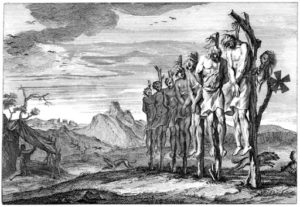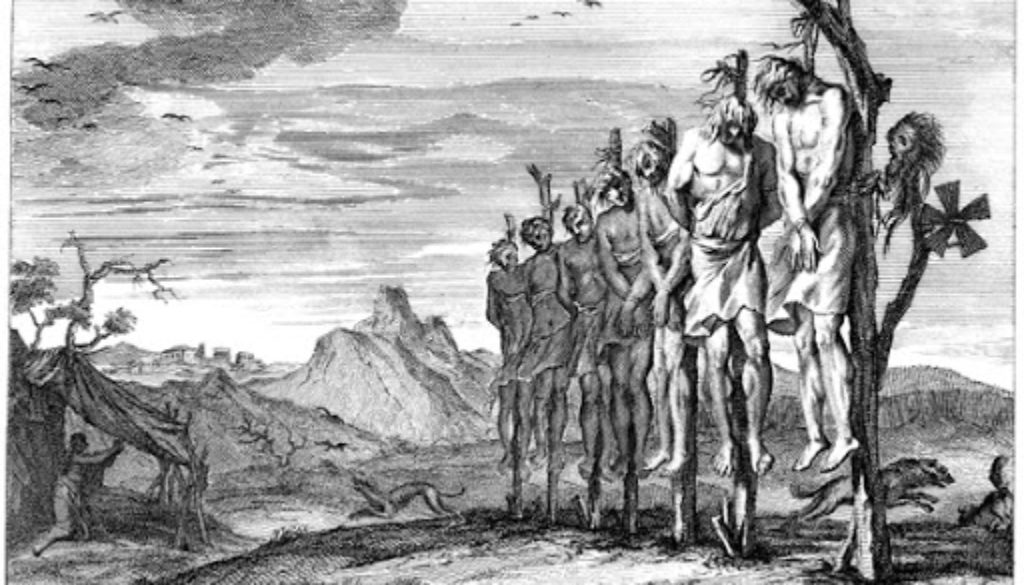2 Samuel 21:1-14 Recompense

David seeks God because there is famine in the land. Bloodguilt is the reason and recompense requires more blood. Saul spilt the blood so his family pays with their lives.
This is one of my least favorite stories in the bible. I hard time with it. I understand requiring a life for taking a life (capital punishment) but not when the life being required had nothing to do with the offense. Jesus’ death follows this same recompense pattern. He had no part in the sin yet He paid the penalty for it. And I, the guilty party, benefit and go free.
But that still leaves me with the sorrow in today’s story. I wonder if David had a hard time with this decision too or was it common place for him? Their request doesn’t seem to raise any resistance, other than that of keeping Jonathan’s son Mephibosheth alive. How David acted afterwards says something too. It feels to me like David is offering atonement of his own in the end.
Let’s join our story, already in progress, and see where the Spirit takes us today.
♥ ♦ ♥
The people of Israel are hungry. There has been little to no rain for three long years. As a result the crops that used to grow lush and full are dry and brittle. The backbreaking task of carrying water to them has kept the people from starving but now even the rivers and streams are nearly depleted. If the Lord doesn’t send rain soon there won’t be anything left but dust.
David has heard the people’s pleas. They have asked him to solve their issue. He knows he is as powerless as the rest of the people when it comes to personally resolving this issue. But he knows the One who can solve it; the Lord.
David goes to the tent holding the Ark of the Lord. His needs are serious and there is no better place to meet with the Lord than at His feet.
Taking a position in front of the door, David lies face down on the ground. He lifts his face just far enough off the dirt to be able to speak his request to the Lord.
“Lord of all creation. God of the universe. Most holy above all things. Your people cry out to You for relief. You have withheld the rains from them. The grasses wither and the trees fail to bring forth fruit. What sin has Your servants committed against You that You deal thus with them? Tell me that I may know how to atone for this sin.”
The Lord did not remain silent. He didn’t speak in a voice that the rest of the people could hear, but He spoke so that David could hear. “There is bloodguilt on Saul and on his house, because he put the Gibeonites to death” (verse 1c).
This was a serious matter. David knew the offense the Lord was speaking of. It was when Saul killed the Gibeonites while punishing the priests of Nob for helping him. It was a true wonder any had survived such a vicious attack.
The Gibeonites and Israel had a long history. They were forced to serve Israel instead of being one of the nations conquered when God led the people into the Promised Land through Joshua. They had tricked Israel into making a covenant with them. They lived but their lives were spent in service. Until Saul killed them in his anger. And that breach of covenant had to be atoned for.
David returned to his home and sent a messenger to the Gibeonites that remained. “The Lord has commanded a recompense for sins committed against you. Come to Jerusalem to stand before the king. He will satisfy this debt.”
Two days later the leaders of the Gibeonites stand before David in his throne room. Both parties to this meeting knew the debt which was owed without even need of specifying. David began the talks.
“What shall I do for you? And how shall I make atonement, that you may bless the heritage of the Lord?” (verse 3).
The leader of the Gibeonites carefully framed his answer. “It is not a matter of silver or gold between us and Saul or his house; neither is it for us to put any man to death in Israel” (verse 4a).
David could not leave the matter unresolved. He pushed on for an answer. “What do you say that I shall do for you?” (verse 4b).
“The man who consumed us and planned to destroy us, so that we should have no place in all the territory of Israel, let seven of his sons be given to us, so that we may hang them before the Lord at Gibeah of Saul, the chosen of the Lord” (verses 5-6a).
“I will give them” (verse 6b) replied David. This was the price of recompense for the bloodguilt. The only way to satisfy this debt.
The Gibeonite leaders went away for now. Once David had seven of Saul’s sons assembled they would be delivered to them.
When David originally searched for someone of Saul’s house he could honor, Mephibosheth, Jonathan’s son was brought to him. But this was not all that remained of Saul’s house. Saul had two sons by his concubine Rizpah who still lived. Their names were Armoni and Mephibosheth. David had to look to Saul’s children’s children to fulfill the number required by the Gibeonites. David would NOT include Jonathan’s son in this number because of the oath that he had sworn to Jonathan. The only remaining “sons” of Saul were those born to his daughter Merab. She had born five sons to Adriel the son of Barzillai the Meholathite. These would complete the payment for the house of Saul’s bloodguilt.
The seven men were taken from their homes and assembled together before David. He felt bound to share with them their fates and the reasons behind it. They would die for the sins of their father, not because David wanted it but because God required it. Blood for blood.
David addresses them as one. “This day your lives will be required of you. Not for your sins but for those of your father, Saul. The Lord requires that the bloodguilt of Saul against the Gibeonites be satisfied. The Gibeonites have requested seven of Saul’s sons pay this price. You will be hanged together at Gibeah to satisfy this debt. Make certain your sins are atoned for and your lives are in order so none of this will rest on your souls. You have until sunset to complete this task. Then you will be in the hands of those your father wronged.”
Each man was allowed to leave David’s presence to put his affairs in order. He was followed by two of David’s men, in case the man tried to escape his portion. None did. With the dignity of king’s sons they accepted their fates.
At sunset the seven sons of Saul appeared before David. The leaders of the Gibeonites also appeared before him. To the Gibeonites David said, “The seven sons of Saul you have required stand before you. Do with them as you have said.” To Saul’s sons David said, “May the Lord show mercy on your souls.”
The Gibeonites bound the hands of Saul’s sons and led them from the throne room. David watched them go with both sorrow and hope. Sorrow for the lives lost. And hope for the forgiveness of sin for Israel. There was no other way to satisfy this debt.
On the first day of the harvest at the beginning of barley season the seven sons were hanged together on a hill in Gibeah. The debt was paid.
Not everyone counted the matter closed though. Rizpah, the mother of Armoni and Mephibosheth took sackcloth and spread it on a rock nearby. She lay on it from the time her sons were hung until the rain fell on them from Heaven. She did this because the bodies of Saul’s sons were left hanging on the hillside. Rizpah kept the birds of the air or the beasts of the field to touch their bodies. She watched over her sons even in death.
David heard of her ministrations to her sons and was touched beyond measure. Now that the debt was satisfied they deserved burial. He would bury them with their father. But to do so he had to get Saul and Jonathan’s bones from the people of Jabesh-gilead.
When Saul and Jonathan fell to the Philistines their bodies were displayed on the wall of Beth-shan. The men of Jabesh-gilead came by night and retrieved their bodies as an act of gratitude for Saul’s standing with them in battle when he was first anointed king. David had honored these men when he became king for the kindness they had shown. Now he needed another kindness from them. The surrender of the bones.
David went himself to make this request. He was accompanied by his personal guards and Zadok the priest. He intended to show all honor possible to Saul and Jonathan during this transition.
The leaders of Jabesh-gilead met David when he arrived at their city. They bowed before him.
“What may we do for our king?”
“I seek the bones of Saul and Jonathan. I would lay them in the tomb of Kish, Saul’s father, along with the bones of his sons who have paid the price for his bloodguilt required by the Lord.”
“We had heard and have prepared them for your arrival.”
An ornate box was brought forth and placed at David’s feet. In it were the bones of both Saul and Jonathan.
“I thank you for the care you have given the Lord’s anointed. You are welcome to accompany Saul and Jonathan on this final journey if you desire.”
“We do and we had prayed you would offer this honor.”
The group set out for Gibeah. It consisted of David, his guards, Zadok, and five elders of the people of Jabesh-gilead. They arrived in Gibeah the next day.
The tomb of Kish was opened. The elders of the people of Jabesh-gilead placed the box containing Saul and Jonathan’s bones on a shelf inside the tomb. David’s guards carefully took the bodies of Saul’s sons from where they hung. Rizpah anointed each of them with oil as they were laid inside the tomb. They had hung too long for washing and wrapping but David placed a cloth over each man’s face before the tomb was sealed.
Once all was completed God responded to the people’s prayers throughout the land. The obstacle had been removed from between Him and His children.
to be continued
♥ ♦ ♥
This last paragraph brings a visual to mind. That of prayers hitting the roof and being bounced back. There are times I have felt like my prayers did exactly that. They weren’t ‘making it through’ to the Lord. I have found that those times are always a result of a block in my relationship with God. I’m ‘going through the motions’ or there is something in my life that is out of line with His word. The ONLY way I have found to address this is the same thing David did; seek God’s face!
This doesn’t mean send up another prayer but truly get on my knees and ask Him to show me my sin. Only when I am truly open and listening with my whole heart will I hear in those times strangled relationship. Because that is exactly what is happening. My sin is choking off our ‘pipeline’ and only the strongest forces can push beyond the clog.
It is NOT easy repairing a broken relationship. It takes hard work and proof of change. But if that relationship is the one with God, it is MORE than worth the work. I glad he doesn’t require blood for blood since Jesus paid with His.
Father God, I honestly don’t know how Saul’s ‘sons’ handled this news. Did they go willingly? Were they dragged kicking and screaming? Did they try to escape? Does it matter? Their lives were forfeit for the acts of their ‘father.’ As a parent, I NEVER want my children to be in that kind of ‘debt.’
I can’t even imagine Rizpah’s grief. But where was Merab? She had five sons hanging there, yet she was absent. It is strange that I didn’t even notice her absence until now. Was she living? If she was she would have to have known about her sons’ fates. I suppose that is another one for our bench time.



